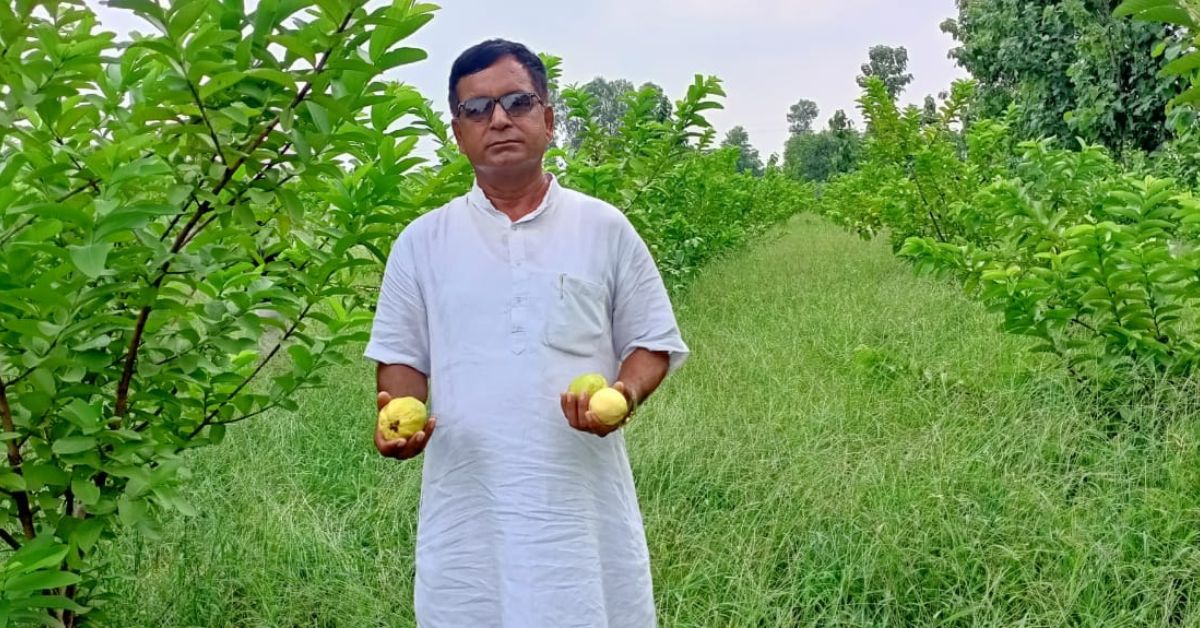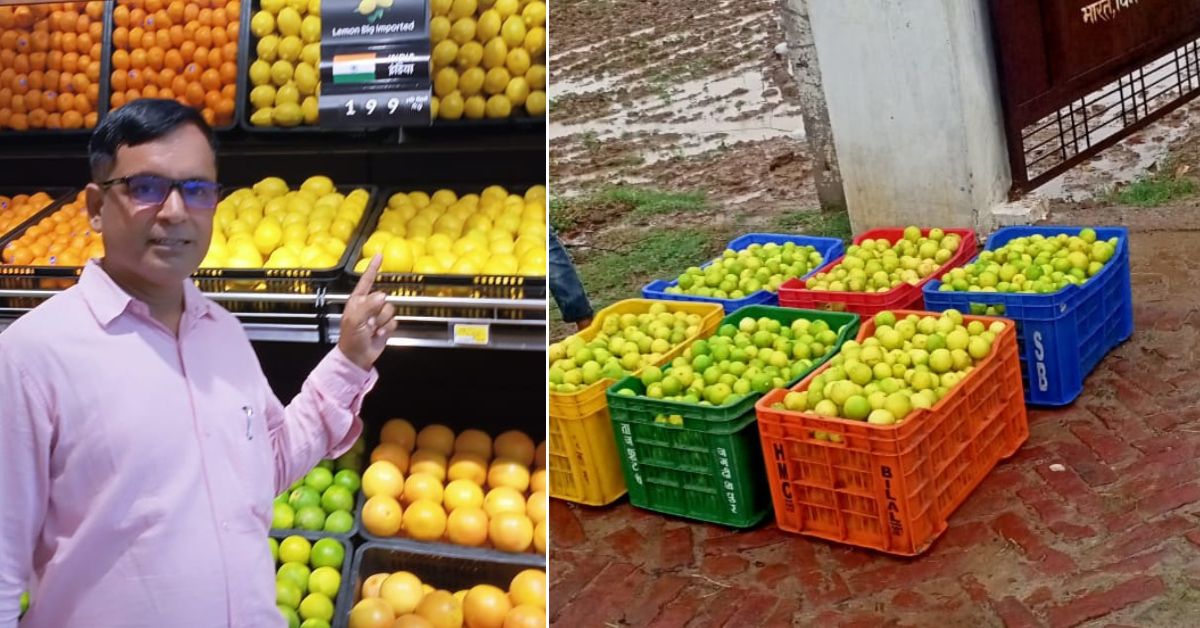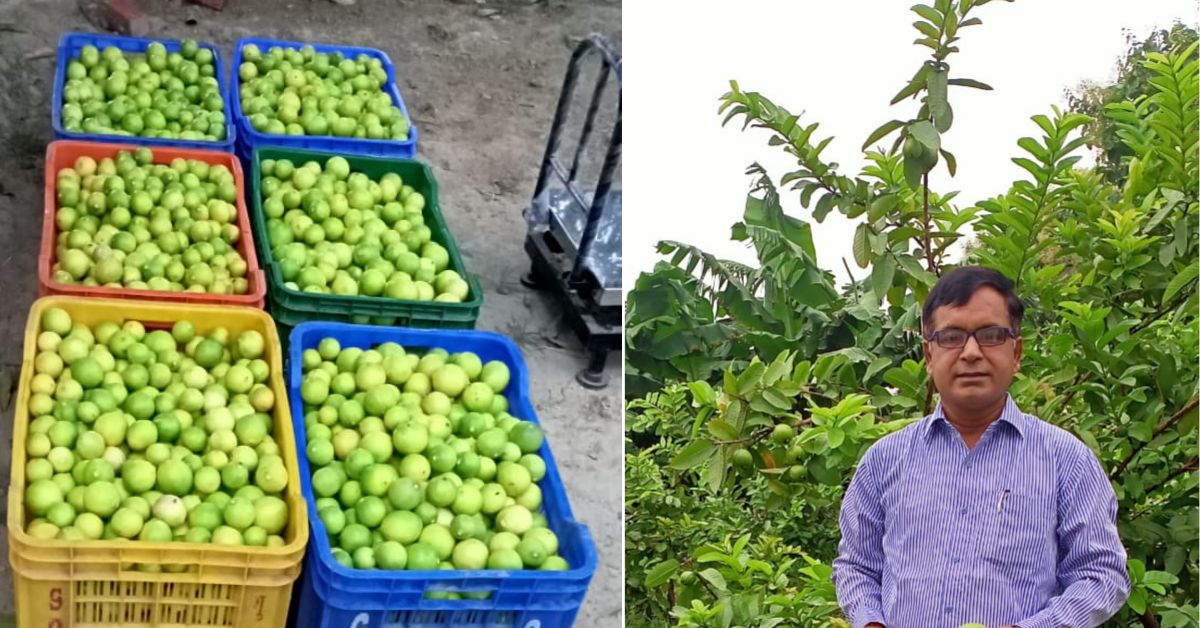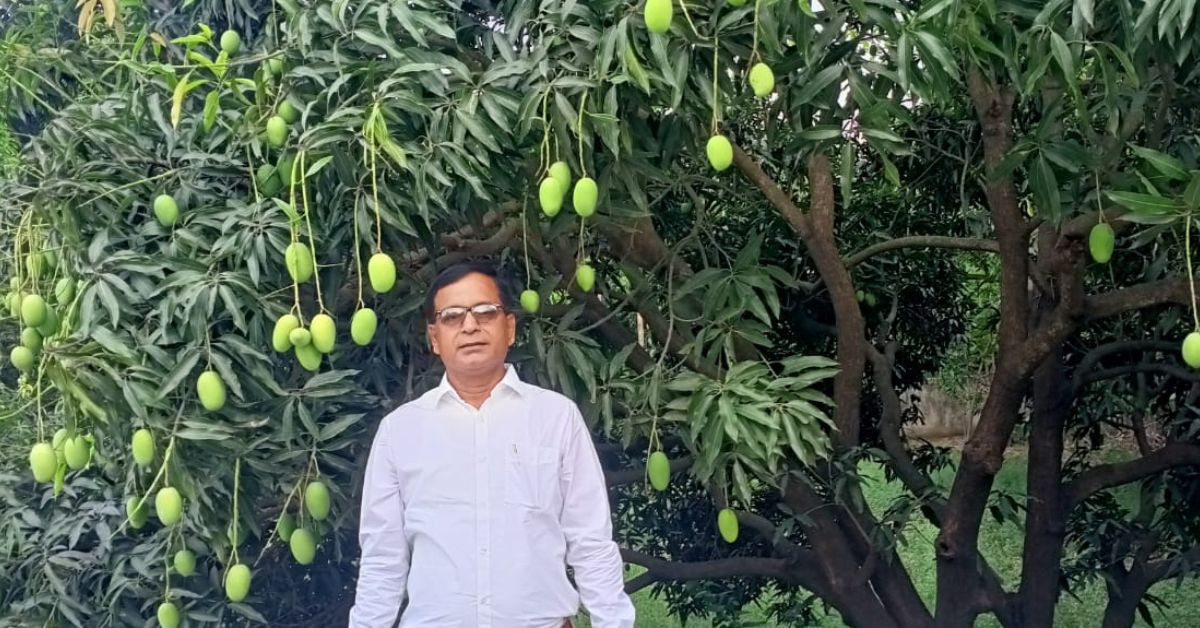‘I Took A Risk & Won’: Wheat Farmer Switched to Growing Lemons, Earns Rs 7 Lakhs Per Harvest
Observing the year-round demand for lemons, Anand Mishra switched from growing traditional crops like wheat, paddy, and peas to cultivating lemons in Uttar Pradesh. With his two-acre farm now yielding Rs 7 lakh in profits, he explains the reasoning behind this 'unconventional' change.

In early 2017, Anand Mishra hit the road in search of lemon farms in Uttar Pradesh. After visiting a few districts, he learnt local farmers largely cultivate wheat, paddy, potato, peppermint, and other crops, except lemon.
“In these traditional crops, farmers usually get profit within five months post-harvest. And they require cash to sow crops for the next season. Because of this financial dependence, they cannot afford to venture into horticulture as it takes years to bear fruits. But I looked at it as a one-time investment with a long-term profit,” he tells The Better India.
This tour inspired him to foray into lemon farming, which is widely practised in states including Andhra Pradesh, Gujarat, Maharashtra, Karnataka, and Madhya Pradesh.
“Lemon farming is new for farmers in Uttar Pradesh. In my district, nobody was growing lemons. So I decided to take the risk, thinking either I’ll learn to swim or I’ll drown,” adds the Raebareli district resident.
But he sailed to success. “I am earning at least five times profits from lemons compared to traditional crops that would have earned me just Rs 40,000 to Rs 50,000 annually,” says Anand, who earns up to Rs 7 lakh on two acres of lemon farm.

Owing to his huge success, today, Anand is dubbed the ‘Lemon Man of Raebareli’. In this conversation with The Better India, he virtually takes us to his lush green lemon farm.
Preferring the farm life over the city noise
Hailing from Kachnawan village in Raebareli district, the BBA graduate worked for 13 years with multinational companies in UP’s Noida, Punjab, and Bihar. While he worked in several cities, he deeply missed his hometown.
“In cities, life is full of obligations. People hide their miseries in makeup. You will find them good-looking but they are not fit from the inside. For rural people, looks do not matter. They breathe clean air and consume organic food,” says Anand.
“Whenever I would visit my hometown, I would be keen to venture into farming. I was happy with the job but wanted to utilise our ancestral land,” he adds.
So by the end of 2016, he quit his job to focus on farming. “Everyone in my family supported me in this decision, except my mother as she was a little concerned about quitting a well-paying job,” he adds.
Anyway, Anand was determined to farm.
In contrast to what his family had been cultivating traditionally like paddy, wheat, gram, peas, and arhar (pigeon pea), he took a risk by opting to grow lemons.

Without any formal training, Anand prepared the soil to sow lemon saplings. To start with, he sowed dhaincha — a tall branching grass used as a manuring crop to increase carbon content in the soil.
After levelling the farm, he planted 900 saplings of lemon that cost Rs 200 each. “I had procured saplings of the Thai variety from a nursery in Varanasi. This variety gives juicy and bigger fruits than regular lemons. Thai lemons weigh up to 100 grams compared to regular lemons which weigh 30 to 50 grams,” he shares.
Highlighting factors to be mindful of in lemon farming, Anand says, “The rows in which saplings are to be planted must be in the direction from east to west, per the wind in the region, so that saplings do not get uprooted in storms. Also, saplings are planted at least one foot deep into the ground. We keep the distance of 10×10 feet between saplings and rows. Also, lemons thrive in soil that has a pH between 6 and 7,” he informs.
Anand says he adopted the low-cost and high-profitability approach to growing lemons and placed 50 plants of mosambi (sweet lime) among 400 lemon trees.
He adds that he uses both organic and inorganic ways to fertilise the soil and control pest attacks. “Before monsoon, I add 15 kg of compost to every tree to get a good yield. Along with this, I add fertilisers like DAP, urea, and potash. Although no chemicals are used in natural farming, we were forced to use chemicals,” he says.

“Usually, in minor fungal and pest attacks, we spray organic pesticides prepared using cow urine, jaggery, garlic, and chillies paste. This mixture needs to be sprayed at a gap of two to three days. But when the damage on leaves is beyond control, we use permitted amounts of pesticides like chlorpyrifos. We only need to spray it once in a season,” he explains.
It took about four years to bear fruits in lemon farms.
Last year, Anand says he harvested 400 crates (or 100 tonnes) of lemons, which were sold between Rs 40 and Rs 70 in the local market. Interestingly, lemon farming also ensures a continuous inflow of income to Anand as lemons are in demand throughout the year.
After an initial investment of Rs 1.85 lakh, today, Anand reaps profits of up to Rs 7 lakh on his two acres of land. More than the huge profits, the 50-year-old finds contentment in leading a stress-free life in the village. If you found our stories insightful, informative, or even just enjoyable, we invite you to consider making a voluntary payment to support the work we do at The Better India. Your contribution helps us continue producing quality content that educates, inspires, and drives positive change. Choose one of the payment options below for your contribution- By paying for the stories you value, you directly contribute to sustaining our efforts focused on making a difference in the world. Together, let’s ensure that impactful stories continue to be told and shared, enriching lives and communities alike. Thank you for your support. Here are some frequently asked questions you might find helpful to know why you are contributing?

“I do not regret quitting my well-paying job. Earlier, I was a servant to a company, now I am a proud owner of a farm. I feel thehrao (composure) in the village,” he shares.
Edited by Pranita Bhat. All photos: Anand Mishra.
This story made me
- 97
- 121
- 89
- 167












